Students did not follow a right-wing trend during university elections at the MLU. But even without fundamental opposition, inner conflicts paralysed the Stura. Now an earlier restart is supposed to fix past issues.
Clear winners of the committee elections from May 16 to May 24, were the SPD (Germany’s social democratic party) affiliated young socialist’s university group, called Juso-HSG Halle. They won the most seats and were also able get the most student votes in the senate.
Contrary to the European and the local elections there can be no talk of a right wing shift among the student government vote at the MLU. Left-of-centre political campus groups were able to maintain and strengthen their majority, even without the green university group being up for election.

Upon request, Nele Sikau, who got a seat in the Stura and the senate in last year’s vote, states that there is simply an absence of newcomers to their group and that due to the lack of active members no one was put for election. Nevertheless, she thinks that the other leftist university groups also take on all issues regarding climate justice. In fact, both the Jusos and the Open Leftist List addressed climate change in their election programme; the TVStud trade union list also mentioned the goal of a climate-neutral university on its flyer.
“Absence of Newcomers”
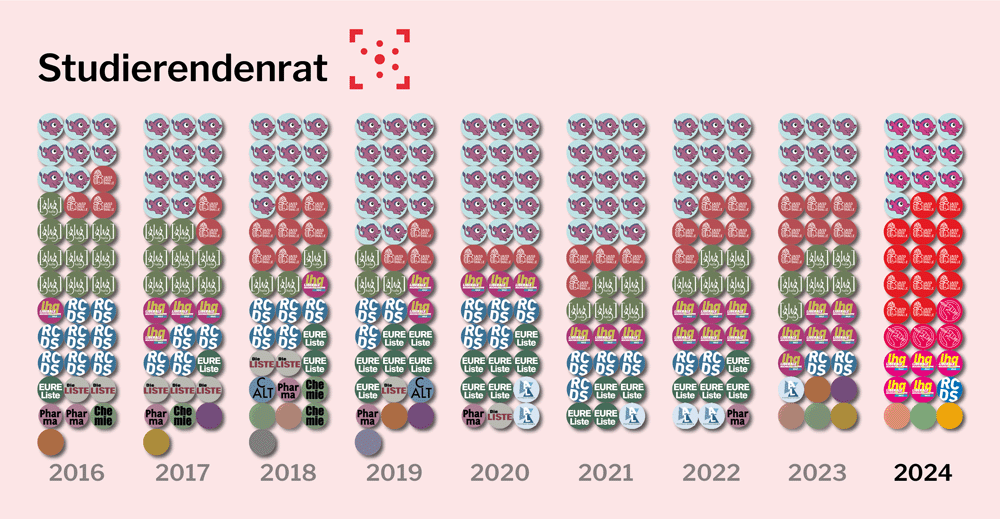
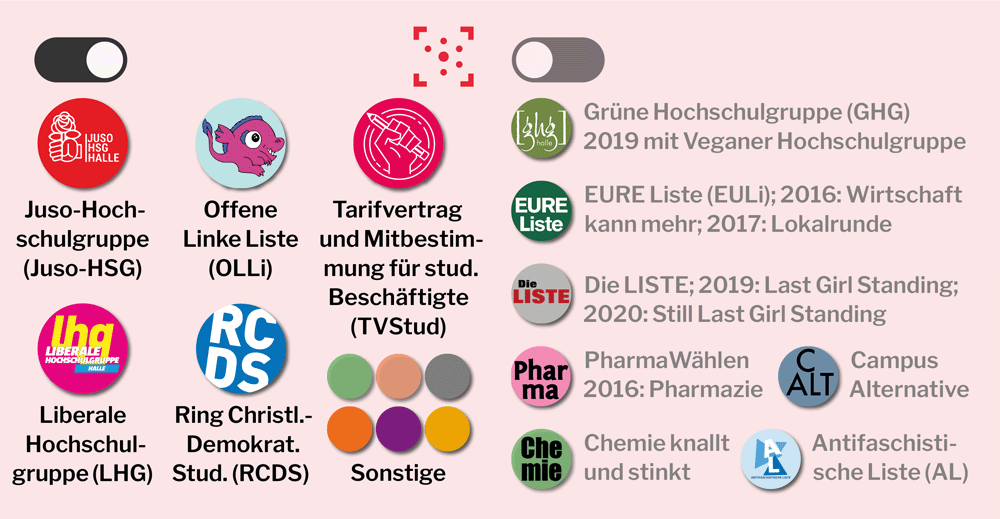
Statements of the Elected

“We are positively overwhelmed with the election results, we are really happy!” states Marica Komarow from the Juso-HSG. She explains their success partly due to the Greens not participating. “We were very active in the Stura before and naturally hope that this made the rounds. We also had a few very committed Stura-representatives and were represented well throughout different student working groups.” In the next two semesters, the Jusos plan to work towards a student prorectorate and, generally speaking, for the university democracy. “Though we also want to tackle queer feminist topics like free menstrual products and address things like digitalization.”
“We were Very Active”
Marica explains the difference between the seat distribution and the political situation seen in the European and local elections with the help of the traditional low level of participation at the university elections, the “academic” bubble and the fact that there are different groups active. Musa Yilmaz, who has occupied a seat for the Jusos for some time already, adds that they were able to constantly better their election results over the past few years and that these results do not mirror what had happened on the municipal and European level. On the one hand, he explains that the Juso-HSG is not a direct subdivision of any party and on the other hand that they have a clear university political profile.

The Open Leftist List (Offene Linke Liste) gained one additional seat in the Stura, a satisfying result for them as Yujin Bohnsack commented. They accredit their success to their election campaign, their presence on multiple Campi and their posts on social media like Instagram.
“Presence on Campi”
Among the goals set by the group, however, is little mention of climate justice. Closest would be the purchase of a cargo bike. Apart from that, the Open Leftist List wants to budget more money for social loans, stand up for a student prorectorate and a quarter-parity in the senate, obtain more digital teaching and student governed spaces at the university and debate about a civil clause. The latter meaning that the university should commit to abstain from working together with military and defence companies.
The Open Leftist List was “shocked” by the results of the European and local elections and stated that they were happy that the right-wing trend hasn’t reached the student body yet. At university, there is supposed to be a more open atmosphere towards new influences, as well as a social environment of open and reflected discourse, whereas elsewhere fear and insecurity might be present. “Another aspect is obviously that there is no AfD, right wing university group at our university, this makes impossible to vote for the extreme right.”
This was different years ago: beginning 2018 the so called “Campus Alternative”, a group ideologically close to the “Identitarian Movement”, had a two-year stint in the student council — with one of 37 seats.

Next to the Greens, Students for Future also did not run for the senate anymore. Since they had run for the first time in 2020, they were able to get one seat four times in a row. Laurin Weger explains why they did not take part in the election by pointing out the few active members of their group and their focus on the organization of the climate education weeks every semester. “To gain new active members, we also advertise our work at the SFF as an ASQ. That’s how we want to widen our commitment to university politics in the future.” Because fundamentally, Laurin finds the work in different committees to be very important. “Wherever there is
a decision made or not made in regards to sustainability, there is also responsibility. For example, especially if you look at the coordination and management of the office of sustainability which has been without a manager for over a year and has not received a job advertisement for even half a position by the rector’s office. That blockades its entire productivity. Over the senate we are currently trying to apply some pressure. At the same time, such stagnation is very frustrating and might even deter people who normally would like to participate.“
“Focus on Climate Education”

The union list TVStud ran for the first time and was successful with four seats in the Stura and one seat in the senate. The Open Leftist List had even expected them to gain a few seats more and is looking forward to future cooperation, as Yujin said. Marica also congratulates the new group. “A lot of us were also on strike for a better collective wage agreement of student employees and many of us are also active in unions. Social and employee issues are extremely important and many in the Stura already have an eye on it. Anyway, the union list is a real enrichment and provides a lot of experience from labour disputes.”
“For Wage Agreements”
Anton Droof, from the list itself, says that he is very satisfied with their results and that everywhere where they were list, they were also able to get some seats, in some committees, like FSR PhilFak I and the FSR MuSpoMeSpre even a third of them. This success is traced back to the local and country wide fight for better pay for student employees. “The result of the collective wage agreements could have been better. Still, a lot of student assistants at the MLU profit from the higher pay and the minimum contract period of one year which we established through the staff council. We showed what we can do together!”

With five seats in the Stura, the Liberal University Group reached a respectable result and returned into the senate. It is not unlikely that the group profited from the absence of the Greens and SFF, two fairly successful groups, whose seats were now vacant. There was one individual candidate who ran under the name of the “Green List” but was unsuccessful. She was still able to unite more votes than all of the four candidates of the Ring of Christian-Democratic Students.There is only one representative of the group in the Stura and thus the conservative camp has shrunk further.
“…”
Neither the RCDS nor the liberals wanted to give a statement. It is likely that the RCDS also has trouble finding new people, as the candidate list shrunk significantly and their social media account has been without updates since 2023.
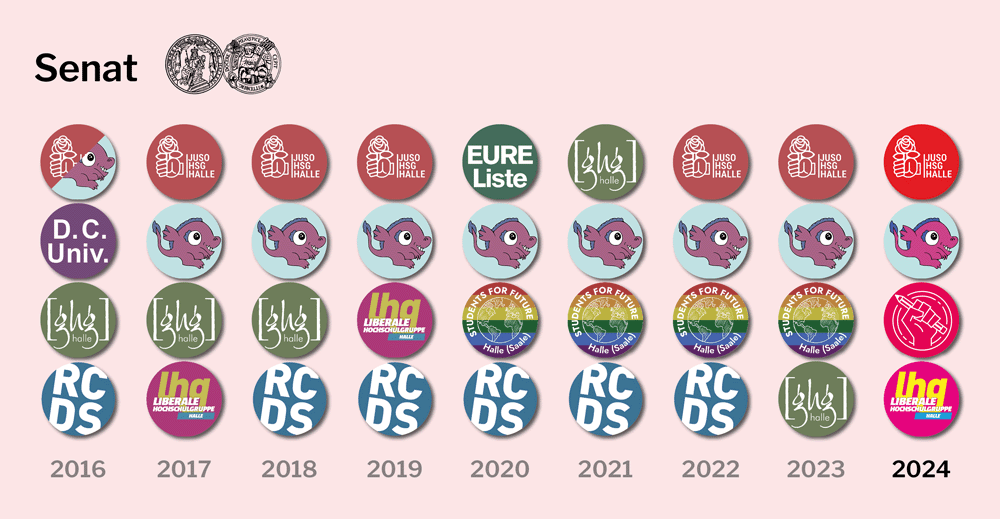
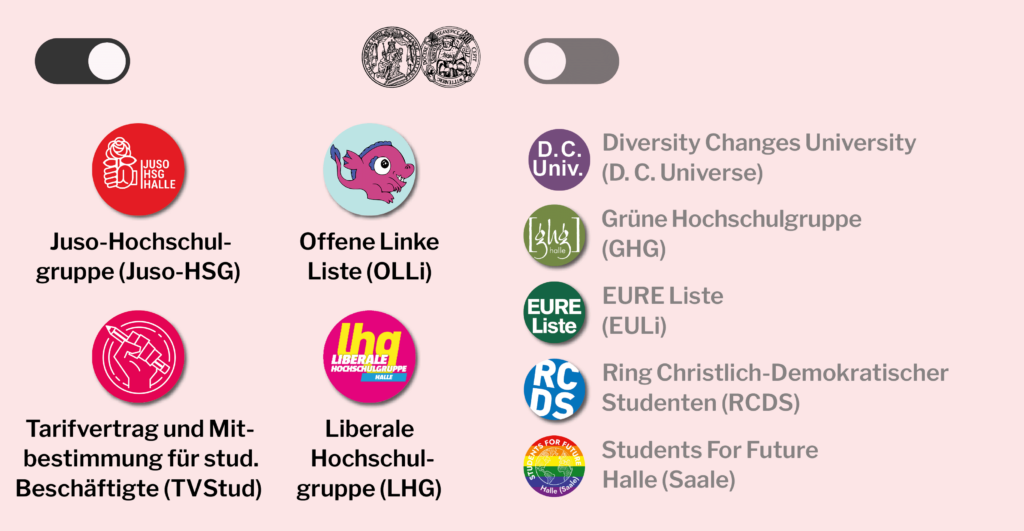
Looking forward
The Stura constituted itself for the first time, relatively early, on June 24. Normally, the new student councils of the different institutes would have come together before the summer break and the Stura later in October. But in this legislative period, the Stura was showing signs of dissolution. Over time members and speakers had repeatedly resigned and left the committee altogether. Partly this was explained by the harsh tone during the meetings. Others turned to other political projects; such as the former representative speakers Anton Borrmann and Jan-Niklas Reiche who both turned their attention to the city council. Generally, open posts are supposed to be filled by runner-ups but these also need to be willing. Thus, over the course of the summer semester several meetings were postponed as the number of present members were unable to qualify as quorate according to the statute.
Yujin from the Open Leftist List described the prior legislative period as “chaotic“. He said that private conflicts do not belong in the student council. Additionally, Yujin stated that it is important to agree on key topics and debate them in a reasonable manner. “Team building in the context of a closed meeting looks like a reasonable tool in order to come together as a Stura and work in the members.” Musa from the Jusos notes, “some problems were projected onto a personal level over time which led to hardening of the fronts. Generally speaking there is no clear answer to what happened but that’s also not really crucial for the cooperation in the new Stura. We have agreed upon looking forward and with a lot new wind do something positive for the student body. We also want to address problems that might occur down the line directly and resolve immediately.”

Anton, who is new for TVStud, has heard a lot. “There are different interpretations of the past happening on which I do not want to rely on. We want to contribute to leave these stories behind and try to together to represent the 20.000 students of the MLU. I count on all the other elected that they also see it that way.” To avoid differences between individual university groups and people, they made the conscious decision to create a completely new list.
A taste of this promised harmony could have been the constitutive meeting. After there have been rumours that the Jusos wanted to claim many spokesperson positions, the actual meeting went on without any great tensions or combative votes. The Jusos were satisfied with four of nine posts, whereby they were allowed to provide the two chairperson positions who are especially important for external presentation of the Stura. Three other speaker roles were filled by the only four members strong TVStud group. Artur Stock from the Open Leftist List has seemingly fallen out of favour. The former of two spokespeople of finance applied two times without success for the substitute spokesman position.
Unexpectedly in the Stura

In many student faculty councils there were less students candidates than there were seats. Same goes for many departmental Stura constituencies where choice was small. In such cases, voters are able to write down their preferred candidate onto the digital ballots. There are three new Stura members who were voted in through this process. One of them is Paul Poethke, who was unexpectedly chosen twice already over the constituency of the medicine department even though he exclusively was up for election for different committees. For his mandate twelve votes where enough. Mathematically speaking, only six people could have voted for him in total as voters were able to give their votes to one candidate twice. “First, I asked myself if I even have the time and the energy for that,” so Paul. Still he wants to pick up his responsibility, “also for the quorum of the committee”. At the same time, he is hoping for an adjustment of the substitution rules, so that another unprepared person from the medicine constituency could take one part of his job.
“Voter turnout is so low”
During the four years that Paul has been involved in student and university committees, he has been concerned with „the question of legitimacy and, in this context, voter turnout in particular“. Student committees should „urgently address the question of why voter turnout is so low and how we can improve this. I would also see this as a social contribution to the promotion of democracy.“
Like last year the list of candidates is spread thin. Especially students outside of organized university groups might have been halted by their tight schedules. As, after the start of the lecture period, there are only three weeks left to decide wether to stand for election or not and if necessary come together as a bigger list as well as fulfil all formal requirements for the application.
The Stura-seat of the preparatory college stays vacant. Since the switch to online voting in 2020, voter participation was constantly at zero.
Germany-semester-ticket is here to stay
In correspondence with the Stura the contract with the HAVAG regarding the reduced-fare Germany-wide semester ticket was prolonged by the Studentenwerk. The Studentenwerk is a public organisation which offers a range of student services in the region, including cafeterias and dormitories. Parallel to the university elections, the Stura tried to find out by ballot vote what students think about it and with 96 % agreement, results were more than clear. While the voter participation was a little bit higher than the ones for Stura and the university senate, the participation fell flat in comparison to the referendums regarding the semester ticket of 2014 and 2018.
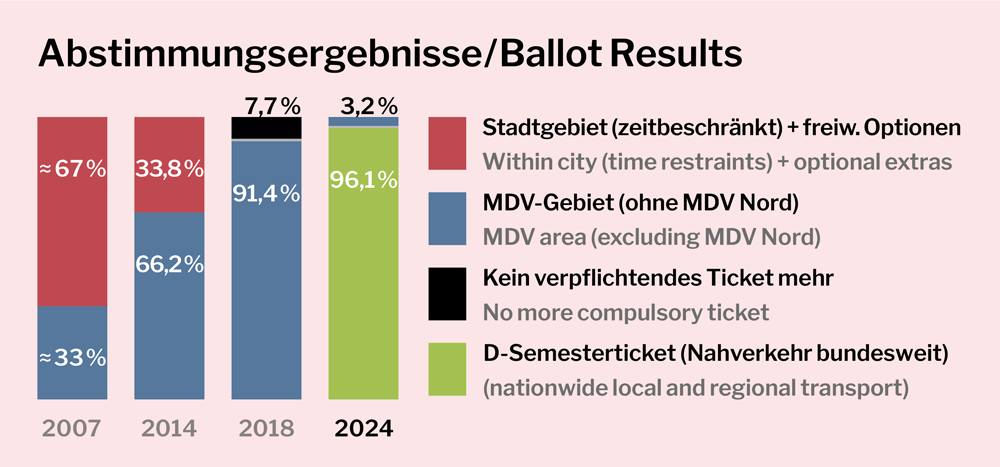
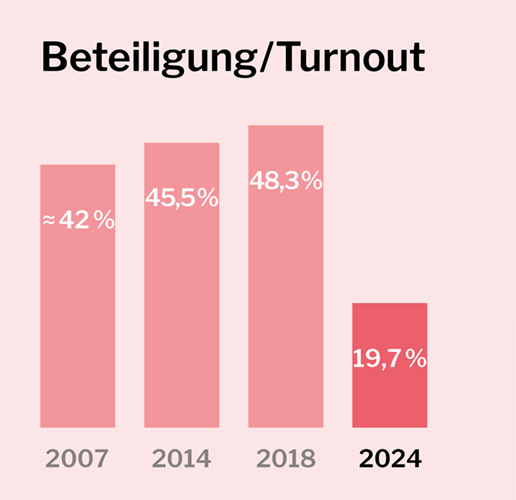
The Germany-ticket for students costs 40% less and thus 176.40 € for six months. This makes it a little bit cheaper than the MDV semester ticket which would have been 177.40 € for the next semester. This price can only be achieved because every student (besides a few exceptions) is required to pay for it via semester fees. In case the Germany ticket’s price increases, the Stura can cancel due to a special right of termination. There was no option to completely vote against the semester ticket because in the event of its rejection the old contract would still run until summer semester 2025.
Students will still be able to take three of their own children up to the age of fourteen with them for free on the HAVAG lines inside of the fare zones of Halle and Merseburg (210, 233). In Halle, they are even allowed to take along their bikes for free after 9 pm. This is different from the old semester ticket as back then bikes were allowed from 7 pm. Still, looking at the conditions there is very little that spoke for keeping the old ticket.
Some irritations arose because of the HAVAG’s new app Movemix which is now necessary for using the new semester ticket. Students report that the app had been logging them out so that the required QR-code was not being shown. Should there be problems with the internet connection, there is no way to log in again. This is met with little understanding during controls, especially outside of the MDV-area. Though, the HAVAG is promising improvement.
Generally it is possible for students to ask for a plastic card with an electronically relayed Germany-ticket at the HAVAG-Service-Centre Rolltreppe. The card will be valid for one semester, after that a new one must be applied for.
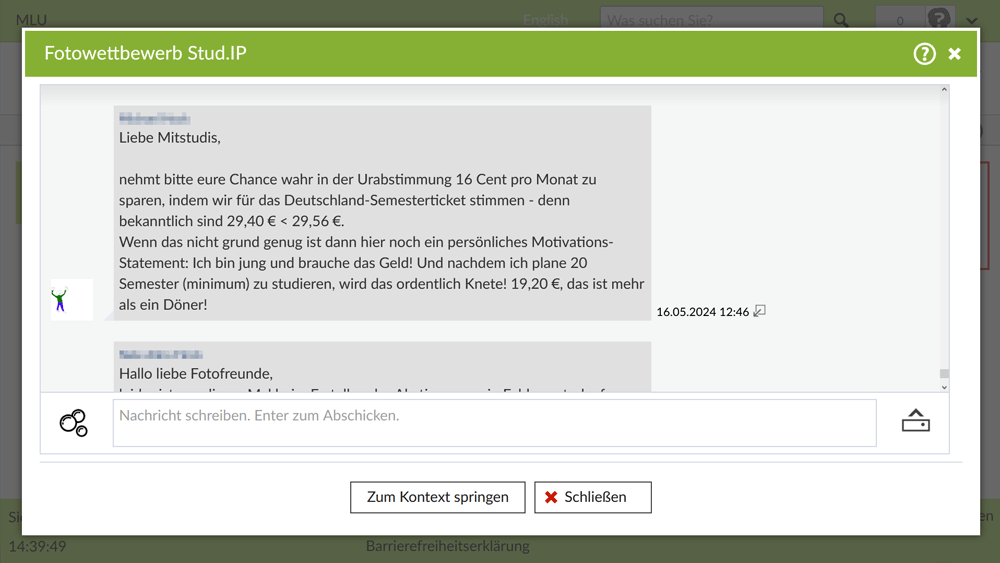
The result of the vote was welcomed by all university group representatives that replied to our enquires. Paul Poethke, an independent Stura member was also happy, “because I find it to be the correct choice. But I am even more happy about the usage of the ballot vote as a tool of direct democracy.” Laurin Weber who wanted this statement to be marked as personal opinion states that its nice to see that the cheaper version of the Germany ticket was chosen, but also in the grand scheme of things related to the turnaround of transportation it’s only one drop in the bucket. He also adds that for some students 30 euros a month can be a lot of money.
Text and graphs: Konrad Dieterich
Translation: Joni Pietryas
Illustration: oompaloompadoopity2 on DeviantArt (CC BY-NC-SA 3.0)
deviantart.com/oompaloompadoopity2/art/Sibling-quarrel-1083858232
